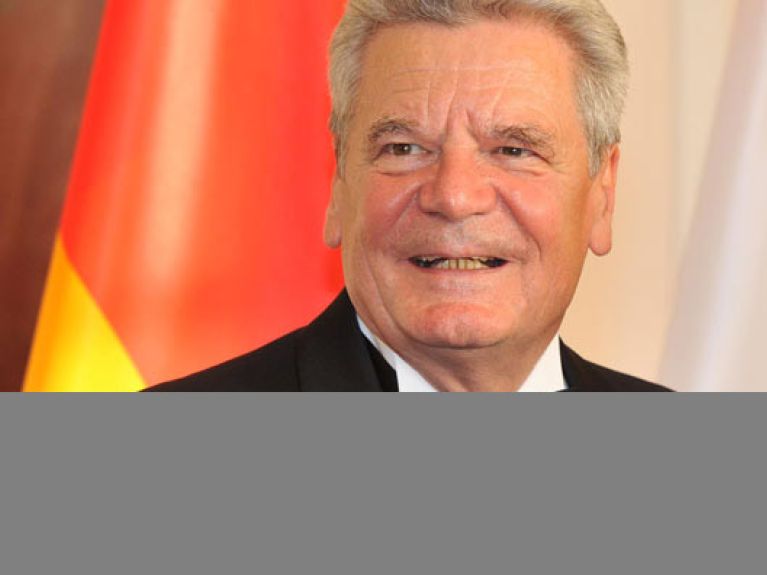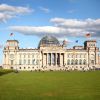“That it is possible to choose courage”
Joachim Gauck, Germany‘s Federal President. A man of hope. A portrait.

Who would have thought it possible in 1989 or 1990, after the fall of the Berlin Wall and the inner German border, that two personalities who had grown up in the GDR would respectively be head of government and head of state in a reunified Germany? Yet that is now the case: Angela Merkel is Federal Chancellor, the first woman at the head of the German government, and Joachim Gauck is the Federal President. This dual leadership marked by an east German past makes an inestimable contribution to the inner unity of the once divided country that in its symbolic and psychological significance is not less important than the financial and social policy efforts to make the new Länder and their citizens at home in the Federal Republic of Germany.
Furthermore, the roots of both the Federal Chancellor and the new Federal President in the former GDR and in their distance to and resistance against its dictatorship constitute an important signal – not only for the Germans themselves, but also their neighbours in eastern Europe. It is possible to say without exaggerated pathos that both Angela Merkel and Joachim Gauck are credible witnesses to a love of freedom born out of oppressive personal life experience that merges seamlessly with the readiness to permanently anchor Germany in a peaceful Europe. This is especially so since both of them understand just how much they owe the freedom movements in neighbouring eastern European countries for their exodus from the unfreedom prescribed by the Communist regime. If one wishes to sketch an initial picture of the new, eleventh German Federal President, then the commonalities in the biographies of and influences on Federal Chancellor Angela Merkel and head of state Joachim Gauck are no less characteristic than the striking differences between these two personalities, which respectively become more discernible in the light of the other.
On the one hand, we have the young sober natural scientist until 1989, who in spring 1990, during the German “transformation” and reunification, immediately throws herself into the hustle and bustle of party political, parliamentary and very soon also governmental work, in which she rapidly climbs to leading positions; she does this without any previous political experience, which is why she is completely underestimated by many of the “old hands”, especially in the western part of the republic, and without any great rhetorical charisma (perhaps the reason for the former?). On the other hand, there is the always emotionally moved and moving pastor and speaker who, although by no means apolitical, was never drawn to pragmatic power and party politics, as if its constraints would endanger his impressively moral tone.
Two styles of politics, two forms of rhetoric, two individuals, who despite their common, but very contradictory, often even conflicting roots in east German Protestantism, could hardly be more different from one another. This remarkable proximity found its most striking expression when Angela Merkel, asked for a laudatory address on the occasion of Gauck’s 70th birthday, said at the beginning of her speech: so much has been said about what a great speaker he is that it would be best if he could present this eulogy himself. Sometimes irony beats pathos.
What are the origins of this Joachim Gauck, who is now meant to bring the gloss back to Berlin’s Bellevue Palace after the premature resignations of two Federal Presidents and the heated arguments about his immediate predecessor? He has received an enormous advance of trust and been burdened with almost unrealizable expectations, because the Germans can very quickly turn from contempt for politics to adoration of politics (and back again).
Joachim Gauck was born in Rostock in 1940, the first year of the Second World War. He is just as much a child of the final war years and the post-war years as a child of the early Communist GDR. His father was arrested by the Soviet secret police in 1951 and twice sentenced to 25 years of forced labour in Siberia, but then returned four years later with the prisoners whose liberation Federal Chancellor Konrad Adenauer was able to achieve in 1955 during his visit to Moscow. The meaning of the two systems of German tyranny and injustice must have been etched in his being following the experiences of his childhood and youth.
In any event, Gauck did not join any of the youth organizations that were actually compulsory in the SED state, so later he was not allowed to study his subject of choice, German literature. Although his study of theology between 1958 and 1965 was a way out of that situation and he was not a particularly enthusiastic theological researcher, it led him into one of the few, limited areas of freedom within the GDR regime – and therefore into a permanent and dogged confrontation with the state. Some, like those enviers and defamers who have subsequently claimed with the security of hindsight that as a pastor he would have had to spend at least a few years in prison before he could be described as a civil rights activist, fail to recognize that under the overwhelming might of the SED and Stasi state Gauck had to maintain the possibility of being able to help the people under his care in everyday situations. And first of all he had to seek out these people in the new housing area of Rostock-Evershagen by going from door to door and from apartment to apartment. “Fishers of men” must start small – but then they can also succeed. In any event, those who heard Joachim Gauck in Rostock in June 1988 preach, “We would want to stay if we were allowed to go” (or could get to know him in Wittenberg in a small work group at the 1983 Lutheran Church Congress), have never had the slightest of doubts that this man is honest and true – to the very core.
Then, after the “transformation” of 1989/1990 came the path into politics – and yet not into politics. Gauck played a major part in ensuring that the files of the Stasi, the secret police of the GDR regime, were not concreted over for all time in the name of swift reconciliation. They were to remain accessible – in order to show the victims of the authoritarian regime how their biographies had been distorted behind their backs and to prevent the victims of the regime being transformed into offenders through false accusations. For ten years from 1990 onwards, Joachim Gauck gave his name, face and profile to the authority charged with making the files accessible.
His principled stand – as said earlier: unfettered by the constraints of reaching consensus in pragmatic party and parliamentary politics – allowed him to become a moral authority. That fact that all the parties with one exception, the Left Party, supported him as their candidate for the highest state office is one of the amazing paradoxes of politics.
After all, as a rule, such “consensus candidates” only arise out of broad and deep approval of the individual. Yet every party must have had and perhaps will still have its difficulties with Joachim Gauck. No one can make demands on him and he has never told anyone just what they want to hear. Suddenly all party politicians wanted to make someone who is totally different from them head of state. This insight perhaps resulted from the realization that they had no equal to offer from among their own ranks. However, this choice can also only come to a positive conclusion because Joachim Gauck – despite every understanding for the human and structural weaknesses of the political animal – will never give in the temptations of antiparliamentary and anti-party populism. Someone who is only allowed to take his place in a liberal democracy in his 50th year of life and since then, as he also admitted after his election, has never missed a poll, knows very well that a democracy does not only need freedom, but freedom also needs carefully cultivated democratic institutions.
Recently, some observers raised doubts about the authority of the post of Federal President following the two resignations – first of Horst Köhler and then Christian Wulff. But perhaps this “crisis of the head of state” is also a subliminal expression of the crisis of our current political situation.
Joachim Gauck with his rather defiant confidence in freedom and democratic responsibility represents a great opportunity to communicate two things to the Germans – self-confidence in their liberal democracy and at the same time the awareness that all citizens must contribute something towards it wherever they are. The French author Ernest Renan once said the cohesion of a nation is a “plébiscite de tous les jours” – an everyday referendum. In that sense Joachim Gauck has the strength and the mandate to become a truly plebiscitary Federal President.
Robert Leicht, former editor-in-chief of weekly newspaper Die Zeit, is one of the best known German journalists.

